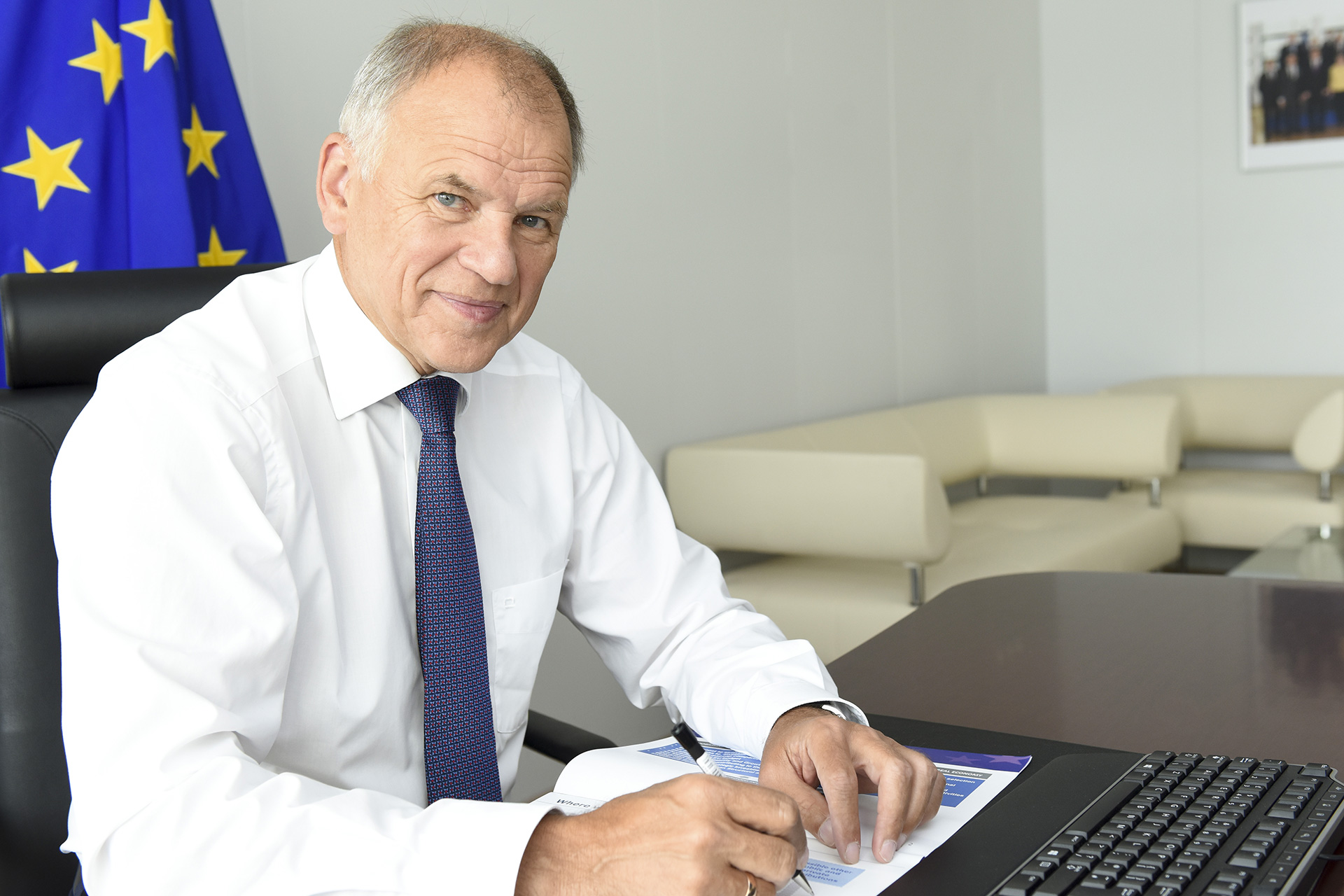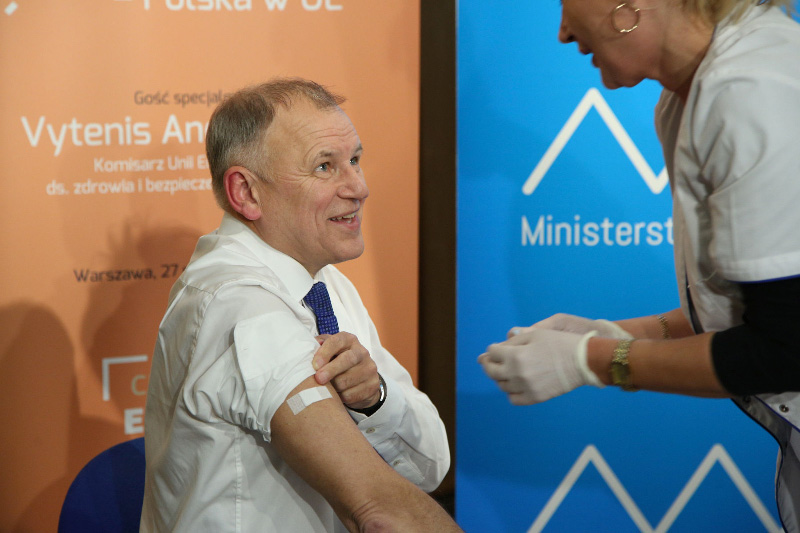‘Vaccination is part of my life,’ says the Commissioner. ‘For me, it’s absolutely crucial to fight for vaccines, and to explain that vaccination is a safe and cost-effective way to protect people’s lives.’
A doctor and former health minister in Lithuania, Andriukaitis will bow out of European politics when the current European Commission mandate ends. But that doesn’t mean he will retire from vaccine advocacy:
‘I have been a vaccine advocate all my life. As a medical doctor I vaccinated myself to protect my patients; as a Minister for Health I was a vocal advocate for vaccines; in the Commission I vaccinated myself and put it on Twitter to show that we are practising what we preaching. I will continue being an advocate until the end of my days.’

Andriukaitis told Vaccines Today of his concern about outbreaks of measles and other preventable diseases in Europe, calling for greater cooperation between EU Member States to respond to cross-border health threats. He also argued for harmonised vaccination schedules across Europe to help families moving across borders while their children are young.
‘We are asking Member State governments to coordinate their national vaccine calendars. As a single market we should understand that a silo mentality in vaccination is very dangerous. We need to harmonise schedules because families may find it’s too under early to vaccinate in one country and too late to vaccine in another.’
The Commissioner pointed to the Joint Action on Vaccination, the recent Global Vaccination Summit in Brussels, and the creation of a coalition for vaccination as highlights of his work on immunisation. He said the coalition will be led in its first phase by health professionals and students but should be expanded to include civil society and other vaccine champions.
An EU vaccination portal, currently being developed by the ECDC and European Medicines Agency, would be up and running in 2020, he said, and he called on social media platforms to do more to address disinformation. ‘We need to ask social media platforms to respect codes of ethics and practice on disinformation to help people find evidence-based information online,’ Andriukaitis said.

Full transcript of interview with Commissioner Andriukaitis
Vaccines Today: You have been a vocal advocate for vaccination throughout your term. Why was this issue so important to you?
Commissioner Andriukaitis: Vaccination is part of my life. I was vaccinated as a child and when I studied medicine I was deeply interested in the history of vaccination – from the discovery by Jenner to the brilliant achievements of the 19th and 20th centuries. I saw with my own eyes in the 1960s and 1970s the challenges and disabilities that affected children with polio, as well as the effects of diseases like diphtheria and measles. Can you imagine going back to the darkness of the 19th or 20th century?
For me, it’s absolutely crucial to fight for vaccines, and to explain to people that vaccination is a safe and cost-effective way to protect people’s lives – especially for infants and young children.
The key to preventing complications from serious vaccine-preventable illnesses is to ensure every community is informed that vaccination not only protects individuals but also protects society. Vaccination is a humanistic task.
How has this translated into action during your term?
The Commission has stepped up a lot of actions in vaccination. We prepared a recommendation, which was adopted by the Council [of EU health ministers], to strengthen European cooperation against vaccine-preventable diseases. Now there are more than 20 countries working on the Joint Action for Vaccination, along with a wide range of stakeholders from civil society and industry.
Following the Council recommendations, a feasibility study is exploring the creation of a unique EU vaccination card, particularly for children. We are also working on vaccines stockpiling and supply forecasting.
This, together with actions on vaccine hesitancy, aim to improve uptake of vaccines in the EU. I’m sure the new Commission will continue this action and commitments, making vaccination a priority issue.
It must be frustrating to see measles outbreaks in several Member States – and very low flu vaccine uptake in some countries. What specific action would you like to see from Health Ministers?
It is an extremely worrying situation. There were 10,000 cases of measles in first half of 2019. The number of EU countries with 95% coverage with two doses MMR is one third of what it was in 2007. We are providing support to Member States to urgently tackle these issues and drive vaccine uptake.
Health is the responsibility of Member States but the cross-border nature of vaccine-preventable diseases requires European coordination and we have a responsibility to take emergency measures against cross-border health threats where required.
We are developing evidence-based tools and guidelines for Member States, including an information portal. This portal, created by the European Centre for Disease Prevention & Control (ECDC) and the European Medicines Agency (EMA), will provide information for the public in all European languages and should be fully operational in 2020.
Our cooperation with national health ministries is intense. We are asking Member State governments to coordinate their national vaccine calendars. As a single market we should understand that a silo mentality in vaccination is very dangerous. We need to harmonise schedules because families moving between Member States may find it’s too under early to vaccinate in one country and too late to vaccine in another.
When you vaccinate yourself, you protect not only yourself, you protect all the people around you. It's a very altruistic, moral, humanistic act. These are the most beautiful values we can all embrace <3#vaccineswork
Join #VaccinationSummit19 tomorrow https://t.co/hcqNRm86lw pic.twitter.com/9yeT9ZkSaD— Vytenis Andriukaitis (@V_Andriukaitis) September 11, 2019
What more could the ECDC do to address outbreaks of vaccine-preventable diseases? Do you think ECDC needs more powers and/or resources to become more like the US CDC?
The ECDC is obliged to monitor infections diseases, provide scientific advice and training, and will also have a role in creating, with EMA, the European vaccine information portal. The ECDC doesn’t have powers like the US CDC but we encourage it, for example, to work with Facebook and social media companies in their efforts to improve access to evidence-based information.
What a day! Feels like we are on our way to build a true community for #vaccines!
🙏 for sharing your stories, for standing up for #vaccination! Let's make vaccines accessible, vaccination easy, vaccine hesitancy history!
👉Speech: https://t.co/fhJrWH4CER#vaccinationsummit19 pic.twitter.com/05ydCPQlNS— Vytenis Andriukaitis (@V_Andriukaitis) September 12, 2019
Do you think Vaccination Summit will have a real impact and do you expect there to be more Vaccination Summits?
I was a big success and I hope it will continue – it showed the EU is a global actor in public health. More than 400 delegates attended, 10,000 followed via web streaming and millions participated via social media. It was also a good opportunity to listen to people who have suffered from diseases or have difficulty accessing vaccines. Together with the WHO, we published a list of 10 concrete actions and we are now concentrating on implementation and ensuring resources are in place to support that plan. Dr Tedros (WHO Secretary General) announced that he would be responsible for calling a follow-up summit so I am optimistic.
Delighted to welcome European Health Commissioner @V_Andriukaitis to Dublin this week. He has been a great friend to Ireland during his term of office as we have worked together on important issues like vaccination, public health, new alcohol legislation & fight against tobacco pic.twitter.com/yUFAyQBNwP
— Simon Harris TD (@SimonHarrisTD) October 25, 2019
You were in Ireland last week where a coalition of health, social and education organisations, and other NGOs, formed an alliance to advocate for HPV vaccination. Is this something the Commission could facilitate? There is a coalition of health professionals and student bodies but could this be expanded to civil society organisations?
There is no doubt that we need all health professionals on our side to explain the benefits of vaccination. We have invited health professionals – including doctors, nurses, pharmacists and others – to join together in a coalition. This will be a very active coalition and I look forward to see how it works in 2020.
But there is also no doubt that we need to broaden the coalition to attract advocates form civil society, as well as others who are attractive to the public. So, we need to build a broader coalition not only consisting of health professionals and students. We need vaccine ambassadors. At the Vaccination Summit, it was clear that contributions from vaccine ambassadors were perceived very positively.
I am really no good in fashion… but it is a nice T-shirt, right? #vaccineswork pic.twitter.com/hU24PhZyla
— Vytenis Andriukaitis (@V_Andriukaitis) March 11, 2019
Do you think social media platforms could do more to reduce the impact of anti-vaccine messages or are you worried about balancing freedom of expression with public health priorities?
We need an open dialogue and close collaboration with all social media platforms. It’s important not to blame or shame people who have real doubts or questions about vaccination. We must answer difficult questions about complications and explain that no one can guarantee that any medicine is completely free of complications or side effects. Vaccines go through rigorous testing and are carefully controlled for safety and efficacy during clinical trials, authorisation and followed up after approval. We need to communicate this.
However, we need to ask social media platforms to respect codes of ethics and practice on disinformation to help people find evidence-based information online. Facebook now ensures that users searching for vaccines information are directed to trusted WHO websites.
The question is who is responsible for removing a lie when it appears on social media. We need to speak about this because distrust in science has serious consequences.
Do you see opportunities for continuing to be a vaccine advocate after your time at the Commission is finished?
Yes! I have been a vaccine advocate all my life. As a medical doctor I vaccinated myself to protect my patients and not transmit viruses. As a Minister for Health I was a vocal advocate for the cost-effectiveness and safety of vaccines. In the Commission I vaccinated myself and put it on twitter to show that we are practising what we preaching. I will continue being an advocate until the end of my days.




